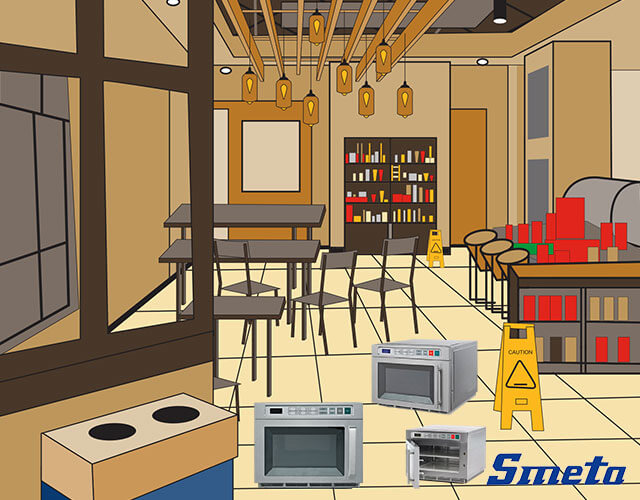If you’re a property/building owner, you’ve probably been asking yourself whether or not it is worthwhile to invest in commercial microwaves and if it is acceptable that you use home or residential appliances instead.
There are some key differences between the home microwave oven and the commercial microwave oven.
The main differences between home and commercial microwave ovens are their power output, reliability, size, and features. Commercial microwaves have higher wattage, durability, and capacity than home microwaves, which makes them more suitable for cooking large amounts of food quickly and efficiently. They also have more sophisticated controls, materials, and safety features that enhance their performance and user experience in a commercial setting. Let us take a closer look at the biggest reasons why you should invest in the commercial microwave to better understand the benefits offered to you.

1. Better durability
Domestic microwaves are designed to quickly heat up popular food soup, pizza, and popcorn. This means they’re built for light use, with no more than 10 minutes of usage per day. In contrast, in a commercial restaurant or food and beverage outlet, microwaves are used far more frequently. They are designed to withstand hours of usage per day, as some commercial kitchens may need to use them non-stop during business hours. Because commercial microwaves are designed for heavy usage, you won’t need to worry about them easily breaking down. Therefore, you need a microwave that is more durable and able to withstand frequent use.
2. Designed for commercial use
On the one hand, a commercial microwave is fully programmable to save your cooking time. Residential microwaves will normally offer some basic programming options for defrosting, cooking a pizza, popping popcorn, or heating a potato. They cover some of the basic household meals to meet the needs and wants of their consumers. In contrast, a major benefit of commercial microwaves is the fully programmable control panel that allows you to perfectly cook a large number of foods by simply pushing a button. This will ensure that your food is cooked quickly and consistently every time, regardless of the dish being served.
On the other hand, a commercial microwave is designed to hold more food. Most of us are familiar with the spinning plate inside every household microwave. Because commercial microwaves are built to hold higher quantities of food, the dishes are too large to rotate. Heat is also distributed much more evenly in commercial units, removing the need for turntables. What’s more, the flat ceramic base of commercial microwaves is easier to clean.
3. Higher wattages
Microwave watts are used to determine the amount of energy that is converted into heat inside a microwave. As the wattage increases, the varieties of foods that can be safely cooked increase. For example, lower wattages like 550 – 700 are good for cooking rice, and keeping coffee warm, but not good for cooking chicken or turkey.
Domestic microwaves have a wattage range from 550 to 1,500, while commercial microwave wattages range from 1,000 to 3,500 watts.
In addition, the microwaves’ wattage usually corresponds with the oven capacity. so does the oven capacity. There is no usually one-size-fits-all answer. The best commercial microwave oven for your business will depend on various factors, including the volume of food you need to prepare and the type of food you’ll be cooking.
4. Size
Commercial microwaves are larger than home microwaves, as they need to accommodate higher quantities of food. They also do not have glass turntables reducing the usable space and are prone to breaking. Commercial microwaves have a flat ceramic base that is easy to clean and does not limit the dish size.
5. Industry-suited service
For those who are running a commercial kitchen, the aftercare and maintenance of a microwave can be just as important as making the purchase. After all, equipment breakdowns can be very costly in a commercial environment, with spoiled food and a negatively impacted business.
Most commercial microwaves have a much longer manufacturer warranty than domestic microwaves. Most domestic microwaves have a 1-year limited liability warranty. Also, there are some unique guidelines a customer must follow to file a warranty claim. If a customer decides to file a warranty claim, they may have to return to the store they purchased it from first, before making the claim.
Commercial microwaves have a manufacturer warranty of more than one year. Like Smeta, as a commercial microwave manufacturer, they offer as long as a 3-year of warranty.

What to look for when purchasing a commercial microwave oven?
Size: You should measure the available space in your kitchen and the dishes you will be using in the microwave. Commercial microwaves come in various sizes and capacities, ranging from 0.6 to 1.6 cubic feet. You should also consider the door opening style, such as side-swing or drop-down.
Frequency of use: You should estimate how often and how long you will be using the microwave in a day. Commercial microwaves are classified by their usage level, such as light-duty, medium-duty, or heavy-duty. Higher usage levels require higher wattage, durability, and reliability.
Cook times: You should check the cook times of the food items you will be heating in the microwave. Commercial microwaves have different wattage levels, ranging from 900 to 3000+ watts. Higher wattage means faster and more efficient heating, but also higher energy consumption and cost.
Ease of use: You should look for a microwave that is easy to operate and maintain. Commercial microwaves have different control panels, such as dial, touchpad, or programmable. You should also check the cleaning and safety features, such as removable filters, stainless steel interior, and interlock system.
Features: You should compare the additional features that different microwaves offer, such as convection, steam, grill, sensor cooking, defrosting, etc. These features can enhance the performance and versatility of your microwave, but also increase the complexity and price.

In a nutshell, many commercial appliances are designed with additional capabilities or features, you’re free to consult us for more advice on how to equip your kitchen with more professional appliances.





